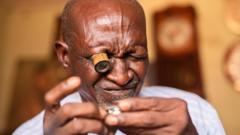In the vibrant heart of Kaduna, Nigeria, the soothing yet poignant sound of ticking clocks emanates from the small workshop of Bala Muhammad, affectionately known as Baba Bala. This 68-year-old horologist’s shop, steeped in history and filled with vintage watches, represents an era slowly fading into memory. Sandwiched between bustling building material suppliers, his repair shop was once a hive of activity, with an impressive workload of over a hundred wristwatch repairs in a single day.
Today, however, things have changed dramatically. With the proliferation of mobile phones, his clientele has dwindled to virtually nothing some days. “There are days when I get no customers,” Baba Bala lamented, attributing this decline to people's reliance on smartphones, which have made traditional watches seem obsolete. “It saddens me to see my skills fading away as technology advances.”
For over half a century, Baba Bala's watch-repair business was not merely a means to earn a living; it was a source of pride that empowered him to educate his children and build a home, all thanks to the art of horology that was passed down from his father. His father, a celebrated watchmaker who traveled across West Africa, instilled in him a passion for timepieces that was nurtured when Baba Bala was just ten years old.
In his youth, watches were regarded with utmost importance, often cherished as much as clothing — providing comfort to wearers who felt lost without them. Yet, the desirable balance has shifted, and the once-bustling market for watch repair in Kaduna is now desolate, leaving many of Baba Bala's contemporaries either dead or retired. One such retiree, Isa Sani, expressed how a lack of customers led him to abandon his repair shop in 2019, opting instead for farming.
Young locals also echoed this sentiment, noting they’d never needed a wristwatch due to constant access to time via their phones. “Why own a watch when I can check the time on my phone?” questioned Faisal Abdulkarim, an 18-year-old neighbor. Yet, amidst this disheartening landscape, there are voices of hope—Dr. Umar Abdulmajid, a communications lecturer, acknowledged that wearable smart technology could spark a new interest in wristwatches, and perhaps revive the watch-repair profession if craftsmen adapt to this evolution.
Despite these futuristic possibilities, Baba Bala remains uninterested in shifting his focus from traditional crafting to smart technologies. “I am a doctor for sick wristwatches,” he insists. “This is what I love doing.”
His dedication is palpable as he continues to open his shop every day, greeted by a smattering of forgotten relics left unclaimed by past customers. While his eldest daughter assists him financially in lean times, he finds solace in the company of his youngest son, Al-Ameen, who, while fascinated by the craft, aspires to be a pilot instead.
As he listens to Hausa programs on his radio, Baba Bala holds onto the hope that, despite the modern age's encroachment, a whisper of his watch-making legacy will endure while he savors the beauty and nostalgia of the timepieces that survived the test of time—just as he has.






















